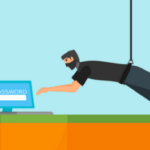Securing the Cloud – Cybersecurity
49% of companies will be increasing their cloud security budgets over the next 12 months in anticipation of future data breaches. The risk of your company’s (or even worse, your customer’s personal information) being intercepted runs far too high to not be keeping up with the latest advances. So, while cloud security spending is predicted to increase by 1 billion dollars in 2021 to make data safer and more secure, the underlying cause may still go on unaddressed. Data breaches are, and probably always will be primarily a human problem.
Although the end of October has brought 2019’s National Cyber Security Awareness Month (NCSAM2019) to a close, this does not mean that learning or worrying about safe online practices isn’t important for the remaining 11 months of the year. It’s a 24 x 7 x 365 operation that commands a lot of your time and attention.
Since there are many ways for malicious users to access your company’s sensitive information, we provide the top 3 causes of data breaches to look out for below.
What am I Looking for?
Phishing Attacks – These are digital messages that take on a legitimate appearance to try to convince you to engage with the call to action. These messages often prompt you to click on a link that will take you an unsecured location where your information is most vulnerable. Hover your cursor over links to preview where they lead. Check for obvious or even subtle differences in the display text versus the link’s destination.
 Be wary of phony attachments that entice you to open them. You may think it’s a trusted document, but it may be loaded with malware that now has access to all of your company’s data. Only open them from the people you know.
Be wary of phony attachments that entice you to open them. You may think it’s a trusted document, but it may be loaded with malware that now has access to all of your company’s data. Only open them from the people you know.
Last, but not least, cyber attackers may ask you confirm social security numbers, company passwords, credit card numbers, etc. If it seems “Phishy,” then it probably is.
Over 90% of cyber attacks involve Phishing. Report any incident you encounter to the Department of Homeland Security immediately.
Stolen/Weak Passwords – Aside from having to worry about fake emails, links and documents, poorly protected/stored passwords are responsible for 81% of  company data breaches. Many people use and re-use predictable passwords that hackers can get a hold of by phishing or installing malware. Your company should encourage accountability and proactive behavior when it comes to creating, using and storing passwords in the cloud. Create complex passwords that are safely stored and protected. Also, be sure to change your password if suspicious activity is detected.
company data breaches. Many people use and re-use predictable passwords that hackers can get a hold of by phishing or installing malware. Your company should encourage accountability and proactive behavior when it comes to creating, using and storing passwords in the cloud. Create complex passwords that are safely stored and protected. Also, be sure to change your password if suspicious activity is detected.
 Unauthorized Users on Work Devices – Working remotely from home increases the risk that an unauthorized user on your device may engage in activity that leaves your company’s information vulnerable to hackers. This individual may visit websites that aren’t secured or download a file infected with Malware/Ransomware. Suddenly, your company’s and your clients’ personal information is at stake. The employee and any other users at home have a shared responsibility to keep this information safe and to avoid activity that increases the risk of a data breach.
Unauthorized Users on Work Devices – Working remotely from home increases the risk that an unauthorized user on your device may engage in activity that leaves your company’s information vulnerable to hackers. This individual may visit websites that aren’t secured or download a file infected with Malware/Ransomware. Suddenly, your company’s and your clients’ personal information is at stake. The employee and any other users at home have a shared responsibility to keep this information safe and to avoid activity that increases the risk of a data breach.
Be Mindful
Human error will most likely always be our biggest concern that software can’t always prevent or fix. We must be mindful of our online activity to compliment cloud security. You should encourage personal accountability and raise awareness about the importance of cybersecurity around the workplace.
Are there any other Cybersecurity tips you would give? Comment and share with us below.
To learn more about Allied’s Private Cloud Service (APCS) and how we can protect your information, contact us today!


Recent Comments